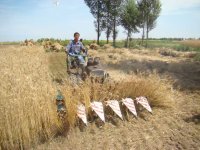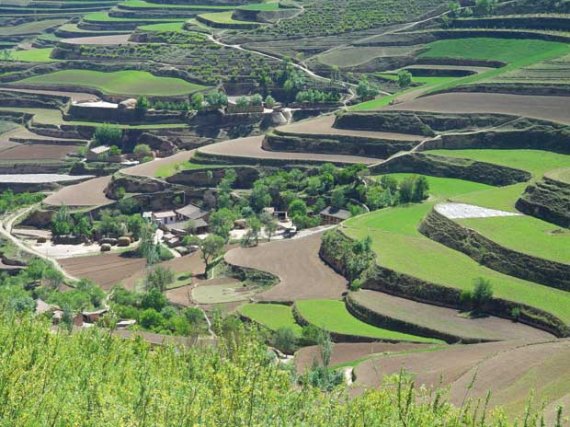Erosion control: the restored terraces of the Loess Plateau.
In 1997 the Chinese student Yuling Bai sent a letter to Evert Jacobsen, Professor of Plant Breeding requesting the opportunity to gain her doctorate in Wageningen. ‘I knew nothing at all about Wageningen and actually wanted to go to the United States,’ says Yuling Bai, who has been working in Wageningen now for almost 17 years. ‘But in the opinion of the scientific committee awarding the grant, if you wanted to study horticulture you had to go to Wageningen. That was “top of the world”.’ And evidently the committee knew what it was talking about. In the 1990s, the Netherlands, small as it is, was the world’s second largest exporter of agricultural products. China could learn a lot from the Dutch example, thought the communist leaders. And so Chinese delegations came to the Netherlands to have a look round the glasshouses. Scouts were sent out too, among other places to Wageningen. Researcher Qu Futian was one of them. He found himself with development economist Nico Heerink. ‘Futian’s superior had told him to keep his eyes peeled,’ relates Heerink. But as it turned out, in time both parties benefitted, because when Qu later left he invited Heerink, with whom he had struck up a friendship, to visit him at Nanjing Agricultural University. Eventually that led to joint research related to sustainable land use. ‘Qu Futian opened a great many doors for us,’ says Heerink. Another scout found himself with Arthur Mol, Professor of Environmental Policy. ‘In 1995 the Chinese student Zhang Lei did her thesis study for the MSc in Environmental Sciences with me. She was an average student, but a very good networker and even while she was still a student, she managed to convince me that I should visit China. And so in 1996 I went there for the first time. Almost nothing but bicycles, cold hotels and hardly anybody who spoke English, but nonetheless it made a big impression. During that first visit in fact, I made the contacts on which I’ve built my current network in China.’
President
Today Arthur Mol is a well-known person in China. He collaborates with the Chinese Academy of Sciences and for years now he has been a guest lecturer in Environment Policy, these days at Tsinghua University, where China’s upper echelons of management are educated. One of his doctoral students is now a professor at this prestigious university and one of his early contacts is the university’s president. ‘When you are collaborating, that helps. You’ve got a safety net higher up and it’s easier to arrange things.’ Mol is one of the few Dutch people to have written a book that has been translated into Chinese. His textbook about ecological modernisation, a theory in which development and environmental management go hand in hand, is compulsory reading for environmental students in China. He goes to China on average three times a year.Each and every year Nico Heerink resides in China for no less than four months. Every summer, from early May to early September, he can found at Nanjing Agricultural University or Zhejiang University. As a guest lecturer, the development economist teaches at both universities, and he writes articles with his Chinese colleagues. Over the years they have been visiting China, Heerink and Mol have seen how the country has slowly changed, opening up to outside influences. But large-scale international research programmes are still quite rare, knows Mol. ‘The country is reticent about employing foreign knowledge. Instances are few and far between.’ Instead, China’s chosen strategy is to wholeheartedly support doctoral research by offering generous grants for a stay at a foreign university. The country is making convenient use of what is known as the sandwich fellowship, which involves the recipient spending the first and fourth years in Wageningen and the intervening years doing research in China. The benefits are twofold: firstly, the doctoral candidate learns the Western method of doing research and the English language, which opens doors to the international knowledge economy; and secondly, he or she researches a relevant issue in China. That gives China immediately useful research and reduces the likelihood of a brain drain of Chinese research talent. Evert Jacobsen, too, is watching China’s scientific development. A breeding industry that invests in knowledge, for example, is still negligible. ‘China’s agricultural research is about 50 years behind our own,’ says Jacobsen. ‘The state-owned research institutes develop new varieties while the breeding companies stick to selling seed.’ But this is changing rapidly, he knows, due in part to the arrival of foreign breeding companies and the mergers between Chinese seed firms and government institutes.
Change
Arthur Mol is certain that come what may the development cooperation phase is over. ‘China believes unerringly in the knowledge economy. More than the Netherlands does. For us, this makes China an interesting place to work: it is highly dynamic and developing rapidly. As they are quick learners, the Chinese are constantly innovating. Moreover, they do interesting experiments. For example, to reduce the number of cars they auction off licence plates. And in an effort to reduce smog, every day 20 per cent of cars aren’t allowed to drive. I’m curious, will that work? And for how long?’As yet, hundreds of doctoral candidates still form a connection between China and Wageningen, but Heerink thinks this success formula will soon be a thing of the past. ‘Most Chinese students are highly focused on the job market. After their MSc they want to find a job, get married and buy a car and a house. That lends status. A PhD position, which means spending another four years in relative poverty, is something they are aspiring to ever less. This is why it is difficult these days to find good people for a sandwich PhD.’ In any event, the pioneers of yesteryear have found good positions. Today Qu Futian is the mayor of a Chinese provincial city of 5.5 million residents. Zhang Lei, the first Chinese student at Environmental Sciences and the person who invited Arthur Mol to China, gained her PhD in Wageningen and is now an associate professor at Renmin University in Beijing. ‘I still collaborate with her a great deal,’ says Mol. After gaining her PhD, Yuling Bai remained in Wageningen. She was appointed associate professor and is now on a tenure track to hold a personal chair at Plant Breeding. But she still returns every year to her university in Henan; she regards it as an honour to teach there.

China looked to the Netherlands for ideas on how to boost food production.
Etiquette
The Chinese and Dutch are similar, thinks Arthur Mol. ‘Both are very goal-oriented, are keen to solve problems and are passionate about making things happen.’ But it must be said, the Chinese are less direct, says Nico Heerink. ‘I soon learned that if I ask my Chinese colleagues something and the answer is “no problem”, it will take them a lot of effort to get it done. If they answer “maybe”, it’s absolutely impossible.’ Another lesson is that as a foreigner you must never speak ill of your Chinese partner in public. ‘You can’t speak negatively about someone in public, because you’ll cause that person to lose face. But one-to-one, you can speak very clearly.’ This rule also applies to China itself. ‘In public you must not be critical of the country. As a foreigner you mustn’t offer advice in the form of: you should do this and that. No, you work with local partners and these partners can exert influence on policy.’ As a rule, these partners are strongly nationalistic, says Mol. ‘Among themselves, they’ll voice criticism of the government and the party, but if a foreigner says the same thing, they’ll get angry.

